November 2022
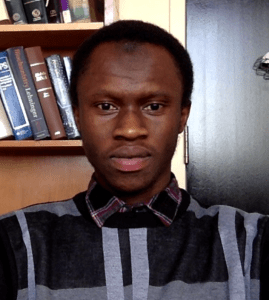 Faisal Nuhu is originally from Ghana. He undertook his undergraduate studies in Biological Sciences at the Kwame Nkrumah University of Science and Technology. Faisal is currently a PhD candidate in the Medical Microbiology and Infectious Diseases Department at University of Manitoba.
Faisal Nuhu is originally from Ghana. He undertook his undergraduate studies in Biological Sciences at the Kwame Nkrumah University of Science and Technology. Faisal is currently a PhD candidate in the Medical Microbiology and Infectious Diseases Department at University of Manitoba.
Research Interests:
HIV infection is still a global burden, and a lot of individuals are getting infected annually and one of the main risk factors that promote HIV acquisition is genital inflammation. Studies have shown how genital inflammation increases HIV risk by increasing the frequencies of HIV target cells, reducing the efficacy of HIV pre-exposure prophylaxis, and impairing the genital mucosal barrier. And so, my research focuses on designing strategies to regulate genital inflammation and by extension reduce HIV risk.
Again, our group recently found a canonical antiviral molecule called Type I interferon to be associated with increased HIV risk. This sounds counterintuitive as type I interferon is known to interfere with viral and so I am interested in finding how it is associated with increase HIV risk.
Publications
- Ssemaganda, A., Nguyen, H.M., Nuhu, F., Jahan, N., Card, C.M., Kiazyk, S., Severini, G., Keynan, Y., Su, R.C., Ji, H. and Abrenica, B. Expansion of tissue-resident CD8+ T cells and CD4+ Th17 cells in the nasal mucosa following mRNA COVID-19 vaccination. Nature Communications (2022).
- Ssemaganda, A., Cholette, F., Perner, M., Kambaran, C., Adhiambo, W., Wambugu, P.M., Gebrebrhan, H., Lee, A., Nuhu, F., Mwatelah, R.S. and Jahan, N., 2021. Endocervical regulatory T cells are associated with decreased genital inflammation and lower HIV target cell abundance. Frontiers in Immunology, 12(2021)
Why I love Immunology:
Immunology is an interesting field of studies and my interest in it started during my undergraduate studies when I was first exposed to how cell communicates with each and how these immune cells and other components of the immune system like antibodies fight against infections. Thinking about the field of vaccinology always peaks my interest to know more about immunology. Knowledge gain from immunology has helped in controlling or eradication of so many infectious diseases.
If I was not an immunologist I would be:
I would be a physician or clinical microbiologist working in a hospital. I have always had passion for working in a hospital at the very young age
Tips for young people who want to enter the field of immunology:
My advice to students who have passion for immunology is that they should try and build a firm foundation, they should know the basics very well as this will help them understand and appreciate how the immune system works.
What being an Immunopaedia Ambassador means to me:
For me being an Immunopaedia Ambassador is a great privilege. It has provided me the platform to get to know more scientist in the field of immunology who are making significant impact. It is also being a means of selling out my passion to whole world in a best way and attracting others toward it.
How I have contributed to Immunopaedia so far and plans for future contributions:
I have sent an article to be published in the breaking news and in future I plan write a summary of the articles myself. I have also interviewed a great scientist in the field of immunology, and I have plans to interview more. I have submitted a short video which was published during the 2022 immunology day, and I will continue to participate in the following years.
You can get in touch with me by
LinkedIn – Faisal Nuhu
October 2022
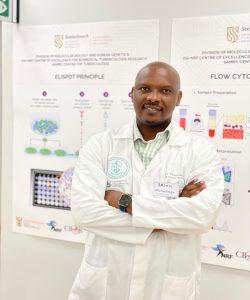 Our October Ambassador of the Month is Brian SM Munansangu who is originally from Zambia. Brian attended the North-West University, South Africa for his BSc and MSc. He is currently a doctoral candidate at Stellenbosch University in South Africa and is funded by the National Research Foundation (NRF).
Our October Ambassador of the Month is Brian SM Munansangu who is originally from Zambia. Brian attended the North-West University, South Africa for his BSc and MSc. He is currently a doctoral candidate at Stellenbosch University in South Africa and is funded by the National Research Foundation (NRF).
Research interests:
My research interests are in the host immunity to Mycobacterium tuberculosis (M.tb) the main cause of human TB. Specifically, am interested in the immunometabolism of innate immune cells such as macrophages and myeloid derived suppressor cells (MDSCs) and adaptive immune cells during infection with M.tb.
Recent publications:
Munansangu BSM, Kenyon C, Walzl G, Loxton AG, Kotze LA, du Plessis N. Immunometabolism of Myeloid-Derived Suppressor Cells: Implications for Mycobacterium tuberculosis Infection and Insights from Tumor Biology. International Journal of Molecular Sciences. 2022; 23(7):3512. https://doi.org/10.3390/ijms23073512
Why I love immunology:
Immunology is the core science at the root of many diseases and understanding or gaining a deeper knowledge of its workings can provide strategies of tackling new/old diseases and treatments, improved vaccines and potentially cures to conditions like TB or HIV/AIDS.
If I wasn’t an immunologist I would be:
Interestingly, I have a background training in dental sciences, so if I was not an immunologist, I would be a dentist.
Tips for young people who want to enter the field of immunology:
Immunology is the gateway to understanding general medicine, and it is your passion I urge you to keeping the flame burning by reading more and stay curious.
What being an Immunopaedia Ambassador means to me:
It’s an honour and privilege to serve as an Immunopaedia ambassador and it is a great platform to interact with immunologist from all over the world.
How I have contributed to Immunopaedia so far and plans for future contributions:
I have summarised and submitted a breaking news article and will be submitting more interesting articles in the near future.
You can get in touch with me by:
Twitter: @MunaBSM
September 2022
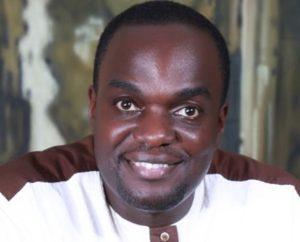 Our September Ambassador of the Month is Ludoviko Zirimenya from Uganda. Ludoviko is a Clinical Research Scientist and PhD student at the The London School of Hygiene & Tropical Medicine (LSHTM). He is a Research Fellow of LSHTM based at the Medical Research Council/Uganda Virus Research Institute & LSHTM Uganda Research Unit. His research focuses on how different populations in Uganda respond to commonly used vaccines and non – specific (beneficial) effects of vaccines such as BCG.
Our September Ambassador of the Month is Ludoviko Zirimenya from Uganda. Ludoviko is a Clinical Research Scientist and PhD student at the The London School of Hygiene & Tropical Medicine (LSHTM). He is a Research Fellow of LSHTM based at the Medical Research Council/Uganda Virus Research Institute & LSHTM Uganda Research Unit. His research focuses on how different populations in Uganda respond to commonly used vaccines and non – specific (beneficial) effects of vaccines such as BCG.
Research Interests:
I am fascinated by how populations respond differently to the same vaccines and the non – specific (beneficial) effects of vaccines. To this end, I seek to answer questions on how environmental exposures (e.g. parasites) affect vaccine responses and how BCG re-immunisation may also be a tool for inducing enhanced benefits for other vaccines. I would like to help improve how vaccines work in Sub Saharan Africa where they are most needed to better prevent morbidity and mortality.
Recent Publications:
- Natukunda, A., Zirimenya, L., Nassuuna, J., Nkurunungi, G., Cose, S., Elliott, A.M. and Webb, E.L., 2022. The effect of helminth infection on vaccine responses in humans and animal models: A systematic review and meta‐analysis. Parasite Immunology, 44(9), p.e12939.
- Zirimenya L, Nkurunungi G, Nassuuna J The POPVAC trial team, et al. Impact of BCG revaccination on the response to unrelated vaccines in a Ugandan adolescent birth cohort: randomised controlled trial protocol C for the ‘POPulation differences in VACcine responses’ (POPVAC) programme. BMJ Open 2020;11:e040430. doi: 10.1136/bmjopen-2020-040430
- Natukunda A, Nkurunungi G, Zirimenya L on behalf of the POPVAC trial team, et al. Effect of intermittent preventive treatment for malaria with dihydroartemisinin-piperaquine on immune responses to vaccines among rural Ugandan adolescents: randomised controlled trial protocol B for the ‘POPulation differences in VACcine responses’ (POPVAC) programme. BMJ Open 2020;11:e040427. doi: 10.1136/bmjopen-2020-040427
Why I love Immunology:
Interestingly, I am a medical doctor, so I have a clinical background. I have had to intentionally ‘love’ immunology. Since falling in love with the field of vaccinology, I had to intentionally force myself to love immunology. It was hard at the beginning but fortunately as I work with immunologists, this now does not require effort as I have learnt and continue to learn from them. As vaccinology explores how the immune system responds to vaccines, immunology is key in understanding the underlying mechanisms of vaccine responses. This keeps me going whenever I question my love for immunology.
If I wasn’t an immunologist I would be:
Earlier on in my career, I worked in palliative care, so I would have ended up as full time Palliative care clinician.
Tips for young people who want to enter the field of immunology:
It is OK to be comfortable with the uncomfortable. You don’t need to love immunology before you join it, one has to patiently hang in there to grow in the field and finally you will fall in love. There will be some bad days where you question yourself but finally it will be worth it if you persevere!
What being an Immunopaedia Ambassador means to me:
As a Clinical Research Scientist, being an ambassador helps me contribute to the promotion of cutting-edge research in clinical immunology. On the ‘selfish’ side, being an ambassador enables me externally contribute beyond my current work helping to establish my standing and reputation in the field.
How I have contributed to Immunopaedia so far and plans for future contributions:
I have been able to write so far two breaking news research articles. Going forward, l plan to aggressively promote the Immunopaedia website educational materials and other resources in my home country and institution.
You can get in touch with me by:
Twitter: @LZirimenya
LinkedIn: Ludoviko Zirimenya
ResearchGate: Ludoviko Zirimenya
August 2022
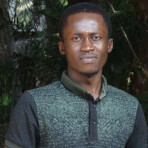 Our August Ambassador of the Month joined us recently in 2022. Mberkadji Ngana Salem is from Chad Republic and has a Master’s graduate degree in Immunology and Infections from Cheikh Anta Diop University, Senegal. He is currently a scientific officer in the TB Immunology Laboratory at the MRC Unit Gambia at LSHTM, working on the development of Host-Directed Therapeutic Approaches to Tuberculosis treatment in Africa.
Our August Ambassador of the Month joined us recently in 2022. Mberkadji Ngana Salem is from Chad Republic and has a Master’s graduate degree in Immunology and Infections from Cheikh Anta Diop University, Senegal. He is currently a scientific officer in the TB Immunology Laboratory at the MRC Unit Gambia at LSHTM, working on the development of Host-Directed Therapeutic Approaches to Tuberculosis treatment in Africa.
Research Interests:
I am specifically focused on further understanding the impact of human macrophage differentiation pathways on Mycobacterium Tuberculosis complex lineages infection.
Why I love Immunology:
I have been fascinated by immunology since I started my studies. I believe immunology has a central role in infection control. Immunology means vaccine and drug development, and also being ready to fight against infections by understanding response mechanisms and physiopathology.
If I wasn’t an immunologist I would be:
I would be a microbiologist. I am interested in microbiology, in fact, I am focused on Immuno-mycobiology.
Tips for young people who want to enter the field of immunology:
Be passionate about immunology and also read a lot! This is the only way to keep a handle on immunology.
What being an Immunopoedia Ambassador means to me:
It’s really a privilege for me to be Immunopaedia Ambassador. This is a great opportunity for networking and learning from other people who like immunology.
How I have contributed to Immunopaedia so far and plans for future contributions:
So far I have submitted a breaking news article. I am enthusiastic that in the future I will do more contributions as soon as possible.
You can get in touch with me by:
Twitter: @mberkadji_n
LinkedIn: Mberkadji Ngana
July 2022
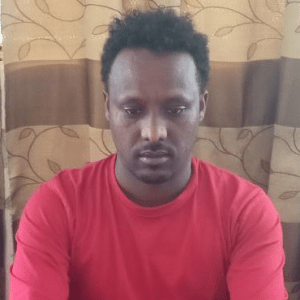 Hylemariam Mihiretie Mengist is our July Ambassador of the Month. Hylemariam is Ethiopian, where he graduated from Haramaya University with a BSc Medical Laboratory Technology and then received a MSc from Addis Ababa University in Clinical Laboratory Science (Diagnostic & Public Health Microbiology) in 2014. He since been involved in teaching, research, community service and clinical service in Ethiopian Universities. He has published more than twenty-five research and review articles in peer reviewed journals. In 2018, he joined the research group of Professor Jin Tengchuan (University of Science and Technology China) to pursue a PhD. degree in biochemistry & molecular biology (structural immunology). Hylemariam has been involved in research in immunovirology and SARS-CoV-2. He is currently an Assistant Professor of microbiology in the department of Medical Laboratory Sciences, Debre Markos University, Ethiopia.
Hylemariam Mihiretie Mengist is our July Ambassador of the Month. Hylemariam is Ethiopian, where he graduated from Haramaya University with a BSc Medical Laboratory Technology and then received a MSc from Addis Ababa University in Clinical Laboratory Science (Diagnostic & Public Health Microbiology) in 2014. He since been involved in teaching, research, community service and clinical service in Ethiopian Universities. He has published more than twenty-five research and review articles in peer reviewed journals. In 2018, he joined the research group of Professor Jin Tengchuan (University of Science and Technology China) to pursue a PhD. degree in biochemistry & molecular biology (structural immunology). Hylemariam has been involved in research in immunovirology and SARS-CoV-2. He is currently an Assistant Professor of microbiology in the department of Medical Laboratory Sciences, Debre Markos University, Ethiopia.
Recent Publications:
- Mengist HM, Kombe Kombe AJ, Jin T. Immune evasion by the highly mutated SARS-CoV-2 Omicron Varian. Accepted on May 12, 2022, in Infection and Drug resistance.
- Khalid Z, Chen Y, Yu D, Abbas A, Huan M, Naz Z, Mengist HM, Cao MJ, Jin T (2022). IgNAR antibody: Structural features, diversity and applications. Fish & Shellfish Immunology, 2022. https://doi.org/10.1016/j.fsi.2022.01.027
- Mengist HM, Kombe Kombe AJ, Mekonnen D, Abebaw A, Getachew M, Jin T. Mutations of SARS-CoV-2 spike protein: Implications on immune evasion and vaccine-induced immunity, Seminars in Immunology, 2021. https://doi.org/10.1016/j.smim.2021.101533
Research Interests:
I am passionate about immunology, biochemistry and molecular biology research. My research interests span over pathogenesis, host-pathogen interaction, drug resistance, immune evasion, vaccine, and drug design. I intend to apply immunological, molecular biology, biochemical and biophysical tools to decipher the comprehensive pathogenesis, diagnosis and immunotherapeutics of diseases. More specifically, I am interested in viral immunology.
Why I love immunology:
I love immunology too much. Immunology is a very complex subject and the gear of host-pathogen interaction studies. The best arsenal to fight against diseases is deep understanding of the immune system. However, studying immunology is quite challenging and I love it because I like a challenge.
If I wasn’t an immunologist I would be:
I would be a biomedical engineer working on designing efficient drug delivery mechanisms in the field of nanomedicine. In other words, I would help immunological therapies be successfully delivered to their targets…ha-ha…still around immunology.
Tips for young people who want to enter the field of immunology:
I advise young individuals fascinated by immunology to be hard working, resilient, dynamic, and patient. Immunology is a multidisciplinary science covering a wide range of professions; therefore, a basic knowledge of biology, molecular biology, biochemistry, biophysics, physiology, and other basic sciences are needed. Hard work is at the core here.
What being an Immunopaedia Ambassador means to me:
There is nothing that makes me happier than promoting one’s profession. Being an Immunopaedia ambassador is promoting my profession, which I love. It is about proving my love to immunology, attracting others to the field, and advancing the field.
How I have contributed to Immunopaedia so far and plans for future contributions
I have written a breaking news article. I plan to actively participate in the future by interviewing renown immunologists, writing article summaries, promoting Immunopaedia and inviting young immunologists to join this platform.
You can get in touch with me by:
LinkedIn: Hylemariam Mihiretie Mengist
ResearchGate: Hylemariam Mihiretie Mengist
June 2022
Our June Immunopaedia Ambassador of the month is Dounia Chraa, a Post-doctoral Researcher based at Functional Genomics and Cancer Unit, of the institute of Genetics and Molecular and Cellular Biology Holding, France. In this interview, she discusses her research, why she loves immunology and why she became an Immunopaedia Ambassador and contributions she has made to spreading immunology knowledge.
You can get in touch with me by: Linkedin – Dounia Chraa and ResearchGate – Dounia Chraa
May 2022
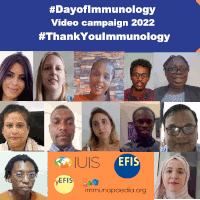 We would like to highlight all the Immunopaedia Ambassadors who took part in the Day of Immunology 2002. We asked our Ambassadors to submit videos answering questions about immunology and vaccines which were showcased on social media in the days leading up to the 29th April, the official International Day of Immunology.
We would like to highlight all the Immunopaedia Ambassadors who took part in the Day of Immunology 2002. We asked our Ambassadors to submit videos answering questions about immunology and vaccines which were showcased on social media in the days leading up to the 29th April, the official International Day of Immunology.
Immunopaedia in collaboration with the European Federation of Immunological Societies (EFIS), young EFIS and the International Union of Immunological Societies took part in a social media campaign celebrating the Day of Immunology.
We would like to thank:
Amana Bokagne, Dimpu Gogoi, Dounia Chraa, Emmanuel Adamolekun, Endalew Yizengaw, Faisal Nuhu, Henok Andualem, Jasmin Knopf, Khaoula Attia, Macarena Mamberto, Margaret Japhet Adeoti, Sabiha Anis, Tatenda Murangi, Wasihun Hailemichael.
You watch all their videos here – 2022 Day of Immunology: Immunopaedia early career researchers
Some montages of our Ambassadors below:
April 2022
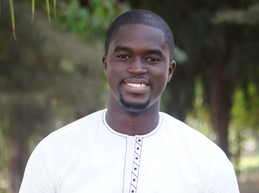 Frédéric Christian Diaz is our April Ambassador of the Month and is based at the University Cheikh Anta Diop of Dakar, Senegal. He has moved from pharmaceutical studies into the biological sciences and is pursuing a Masters in Immunology and Infection.
Frédéric Christian Diaz is our April Ambassador of the Month and is based at the University Cheikh Anta Diop of Dakar, Senegal. He has moved from pharmaceutical studies into the biological sciences and is pursuing a Masters in Immunology and Infection.
Research Interests:
As a young immunology student, immuno-parasitology and immuno-allergy are my fields of interest. To receive my Doctor of Pharmacy I completed a thesis about the Immunology of Bilharzia and the immuno-modulation observed. I am two years into my Masters of immuno-infection where I am focusing on the Expression of RFcƐ1 on neutrophils in Atopic dermatitis on Senegalese people (West-Africa). I specifically focus on the aspects of lesion tissues, histological environment and immune cells activated and their roles during acute, chronic, and therapeutic phases.
Why I love Immunology:
I have always had a deep inquisitiveness about the human body and physiological mechanisms. I remember, as a child, asking family and teachers about how the human body works. I have found those answers in immunology.
If I wasn’t an immunologist, I would be:
A military officer (laugh), I have a lot of admiration for soldiers, I see their respect, order, humility, and discipline.
Tips for young people who want to enter the field of immunology:
The most important is an unconditional love for the field, second would be discipline and third; team spirit and lastly; challenging yourself.
What being an Immunopaedia Ambassador means to me:
Being an immunopaedia ambassador is one the best ways for scientists to exchange information from diverse backgrounds; it is a big opportunity to learn from one another. I would also like showcase scientists’ potential which is often underestimated.
How I have contributed to Immunopaedia so far and plans for future contributions:
I have submitted new articles; T cells and skin disease and Atopic dermatitis and the skin microbiome. I really want to be an active Ambassador and partner of Immunopaedia, so more submissions are coming.
March 2022
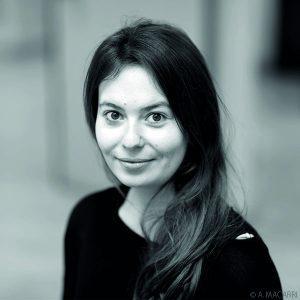 Our March Ambassador of the Month is Maria-Bernadette Madel, a Postdoctoral Associate based in the USA. Maria completed her PhD in Immunology and Microbiology at the University Côte d’Azur in Nice, France, where she was working on the identification of potential mechanisms that play a role in inflammatory bone destruction. During her postdoc at Baylor College of Medicine in Houston, TX, USA, Maria worked on the identification of mechanisms in age-related bone loss.
Our March Ambassador of the Month is Maria-Bernadette Madel, a Postdoctoral Associate based in the USA. Maria completed her PhD in Immunology and Microbiology at the University Côte d’Azur in Nice, France, where she was working on the identification of potential mechanisms that play a role in inflammatory bone destruction. During her postdoc at Baylor College of Medicine in Houston, TX, USA, Maria worked on the identification of mechanisms in age-related bone loss.
Research interests:
My research interest is in osteoimmunology and in the immune function of osteoclasts.
Recent publications:
- Halper J, Madel MB, Blin-Wakkach C. Differentiation and Phenotyping of Murine Osteoclasts from Bone Marrow Progenitors, Monocytes, and Dendritic Cells. Methods Mol Biol. 2021. 2308:21-34.
- Madel MB, Fu H, Pierroz DD, Schiffrin M, Winkler C, Wilson A, Pochon C, Toffoli B, Taïeb M, Jouzeau JY, Gilardi F, Ferrari S, Bonnet N, Blin-Wakkach C, Desvergne B, Moulin D. Lack of Adiponectin Drives Hyperosteoclastogenesis in Lipoatrophic Mice. Front Cell Dev Biol. 2021. Apr 1;9:627153.
- Madel MB, Ibáñez L, Ciucci T, Halper J, Rouleau M, Boutin A, Hue C, Duroux-Richard I, Apparailly F, Garchon HJ, Wakkach A, Blin-Wakkach C. Dissecting the phenotypic and functional heterogeneity of mouse inflammatory osteoclasts by the expression of Cx3cr1. Elife. 2020. May 13;9:e54493.
Why I love immunology:
I love immunology because immunology is the foundation of modern medicine, which has been highlighted once more by the recent development of the COVID vaccine.
If I wasn’t an immunologist, I would be:
I would be an archeologist, because that way I could find out what was going on in ancient times.
Tips for young people who want to enter the field of immunology:
My advice for young scientists who want to break into the field of immunology is to be curious, never stop exploring, and most importantly, start building your network as soon as possible, as this can help you get guidance and ideas for your research, but also to build career as a future scientist.
What being an Immunopaedia Ambassador means to me:
I joined immunopaedia in 2018, being part of the immunopaedia family is a great opportunity, not only because I can connect and network with immunologists around the globe, but also because I can promote research and knowledge about immunology and contribute to immunology education.
How I have contributed to Immunopaedia so far and plans for future contributions:
So far, I have written several articles for the Breaking News section and conducted an interview with Dr. Andreas Bergthaler (Immunologist of the Month 2020). In the past, I have also been involved in keeping the content of our website up to date and designed some online course questions on various topics. My most recent contribution is a summary article on how the gut microbiota is related to the development of Alzheimer’s disease, and I have many more plans for future contributions.
You can get in touch with be by:
LinkedIn: MBMadel
Twitter: @MB__Madel
February 2022
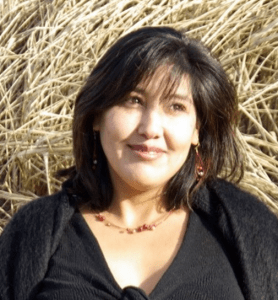 Our February Ambassador of the Month is Yanet Valdez Tejeira, MSc PhD. Yanet is an Independent Scientific Consultant in Vancouver, Canada. Yanet is the British Columbia leader of the COVID19 resources, an initiative that supports Canada’s response to the pandemic. She leads “Vaccine Conversations”, a program that addresses vaccine confidence. She is one of the experts in the weekly vaccine questions and answers from the public and helps to explain the pandemic to the citizens in plain language. She is also an invited Professor at Universities in Peru, Ecuador and Colombia where she teaches Immunology to Graduate Students and Medical Doctors. Yanet is also a member of the board of directors of the Anti-NMDA Receptor Encephalitis Foundation Inc.
Our February Ambassador of the Month is Yanet Valdez Tejeira, MSc PhD. Yanet is an Independent Scientific Consultant in Vancouver, Canada. Yanet is the British Columbia leader of the COVID19 resources, an initiative that supports Canada’s response to the pandemic. She leads “Vaccine Conversations”, a program that addresses vaccine confidence. She is one of the experts in the weekly vaccine questions and answers from the public and helps to explain the pandemic to the citizens in plain language. She is also an invited Professor at Universities in Peru, Ecuador and Colombia where she teaches Immunology to Graduate Students and Medical Doctors. Yanet is also a member of the board of directors of the Anti-NMDA Receptor Encephalitis Foundation Inc.
Research interests:
My research interests are in mucosal immunology and pathogenesis.
Recent publications:
My latest publication reflects my growing interest in Equity, Diversity, and Inclusion in Academia: “Equity, diversity, and inclusion in academia: lessons from the Canadian Society of Immunology.
Why I love immunology:
I love immunology because I’m constantly learning about our fascinating immune system. I’m captivated by how intricate and sophisticated the system is, and how it has evolved to protect us from dangers, even the ones posed by our own bodies.
If I wasn’t an immunologist I would be:
A paleontologist, or I would tend to a sustainable garden.
Tips for young people who want to enter the field of immunology:
Be compassionate with yourself, because the work can be mentally, physically, and emotionally demanding.
What being an Immunopaedia Ambassador means to me:
It offers me an opportunity to share the amazing work of Immunopaedia with the world. Access to education is incredibly important to me, and I love how Immunopaedia is making information on immunology easier to access for everyone, especially low-income and under-resourced students.
How I have contributed to Immunopaedia so far and plans for future contributions:
I have made a video for Immunopaedia interviewing the co-founders of Global ImmunoTalks. I’m currently recruiting for “Immunologist of the Month”, and plan to make more content and amplify the work of Immunopaedia via my other Twitter account, @ImmunoLatinXs.
You can get in touch with me by:
Reaching out via Twitter – @YaneValdezT or LinkedIn – Yanet Valdez Tejeira
January 2022
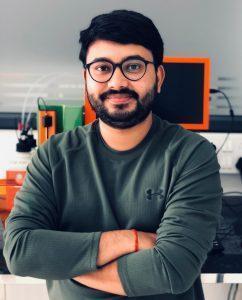 Our first Ambassador of the Month for 2022 is Gaurang Telang; a research assistant at Logical Life Science Pvt. Ltd, Pune, India and final year master student at D.Y. Patil University, Pune, India.
Our first Ambassador of the Month for 2022 is Gaurang Telang; a research assistant at Logical Life Science Pvt. Ltd, Pune, India and final year master student at D.Y. Patil University, Pune, India.
Research interests: T cell immunology and related T cell subsets in chronic inflammatory diseases such as chronic kidney diseases. I also focus on multiplex flow cytometry of cytokines and chemokines. As a master’s student in my final year, I am working on tumor-infiltrating lymphocytes and cytokines on primary tissue and blood samples.
Recent publications:
- Badodekar, N., Sharma, A., Patil, V., Telang, G., Sharma, R., Patil, S., Vyas, N., & Somasundaram, I. (2021). Angiogenesis induction in breast cancer: A paracrine paradigm. Cell biochemistry and function, 39(7), 860-873. https://doi.org/10.1002/cbf.
3663 - Vyas, N., Mishra, S., Telang, G., Badodekar, N., & Kumari, M. (2021). Cytokine Storm in COVID- 19: A Thing to Worry About or Not? 1(2), 1–2.
- Vyas, N., Telang, G., Mishra, S., & Kumari, M. (2021). Keratoacanthoma: Understanding by Immune Responses. 1(2), 4–6.
Why I love immunology: Since my undergrad immunology has fascinated me due to the striking resemblance of complexity to human society. Moreover, immunology is the culmination of cell biology, molecular biology, and biochemistry.
If I wasn’t an immunologist I would be: Biological illustrator, in fact, I do make biological comics and scientific illustrations.
Tips for young people who want to enter the field of immunology: As an early-stage researcher myself I have 3 tips for students looking to enter immunology. First, clear the basics of biology and never forget the “WHY”. Second, don’t limit yourself to a particular stream of immunology early on such as infectious biology or cancer immunology. The third tip would be to learn (as much as possible) to understand, analyse and interpret experimental data from research papers such as flow cytometry, sequencing, etc.
What being an Immunopaedia Ambassador means to me: Immunopaedia is an amazing platform to share knowledge on novel studies and perspectives to everyone for free and as an ambassador, this means a lot to me to share this amazing platform with as many as possible.
How I have contributed to Immunopaedia so far and plans for future contributions: I have written a breaking news article and am currently working on more. Furthermore, I am planning to interview immunologists and share their research.
You can get in touch with me by: LinkedIn










